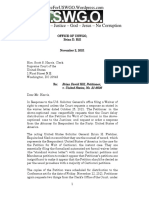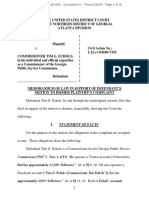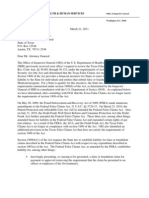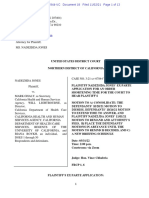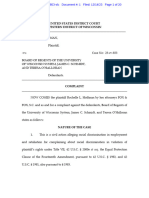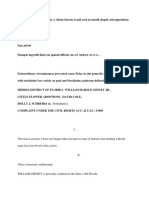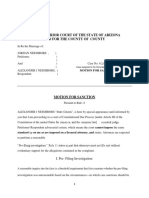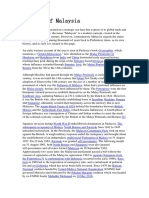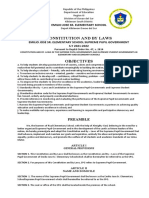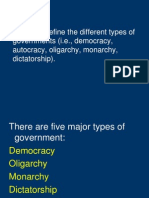0 ratings0% found this document useful (0 votes)
153 views13-012058 Motion To Intervene
13-012058 Motion To Intervene
Uploaded by
Equality Case Files[In Re Marriage of Brassner and Lade] State of Florida's - through Attorney General Bondi - motion to intervene. Filed September 12, 2014
Copyright:
© All Rights Reserved
Available Formats
Download as PDF, TXT or read online from Scribd
13-012058 Motion To Intervene
13-012058 Motion To Intervene
Uploaded by
Equality Case Files0 ratings0% found this document useful (0 votes)
153 views10 pages[In Re Marriage of Brassner and Lade] State of Florida's - through Attorney General Bondi - motion to intervene. Filed September 12, 2014
Original Title
13-012058 Motion To Intervene
Copyright
© © All Rights Reserved
Available Formats
PDF, TXT or read online from Scribd
Share this document
Did you find this document useful?
Is this content inappropriate?
[In Re Marriage of Brassner and Lade] State of Florida's - through Attorney General Bondi - motion to intervene. Filed September 12, 2014
Copyright:
© All Rights Reserved
Available Formats
Download as PDF, TXT or read online from Scribd
Download as pdf or txt
0 ratings0% found this document useful (0 votes)
153 views10 pages13-012058 Motion To Intervene
13-012058 Motion To Intervene
Uploaded by
Equality Case Files[In Re Marriage of Brassner and Lade] State of Florida's - through Attorney General Bondi - motion to intervene. Filed September 12, 2014
Copyright:
© All Rights Reserved
Available Formats
Download as PDF, TXT or read online from Scribd
Download as pdf or txt
You are on page 1of 10
IN THE CIRCUIT COURT OF THE SEVENTEENTH J UDICIAL CIRCUIT
IN AND FOR BROWARD COUNTY, FLORIDA
FAMILY DIVISION
IN RE THE MARRIAGE OF
HEATHER BRASSNER,
Petitioner, CASE NO. 13-012058 (37)
and
MEGAN E. LADE,
Respondent.
_____________________________________/
STATE OF FLORIDAS MOTION TO INTERVENE
The State of Florida, through Attorney General Pamela J o Bondi and pursuant to Florida
Rule of Civil Procedure 1.230, Florida Family Law Rule of Procedure 12.210, and section 16.01,
Florida Statutes, moves for leave to intervene. The Attorney Generals office has monitored this
case and other similar actions and has defended related challenges to Floridas marriage laws in
federal and state court. Now the Attorney General seeks to participate in this case to defend state
law, ensure further review if necessary, and promote an orderly resolution of the legal issues
presented.
The challenges to Floridas marriage laws turn on the same question: Whether the
Fourteenth Amendment to the United States Constitution requires a state to recognize same-sex
marriage. The United States Supreme Court has the final word on federal constitutional
questions, and it is likely to resolve this question definitively in the near future. Until then, the
State of Florida has an interest in defending its laws against challenges asserted by the petitioner
here.
Filing # 18197595 Electronically Filed 09/12/2014 05:33:17 PM
LEGAL ARGUMENT
Authority to Intervene
The Attorney General is charged under section 16.01, Florida Statutes, to appear in and
attend to, in behalf of the state, all suits in which the state may be a party, or in anywise
interested. This case involves a challenge to certain of the States statutory and constitutional
provisions, so the State has an interest in the lawsuit. See State ex rel. Shevin v. Kerwin, 279 So.
2d 836, 837-38 (Fla. 1973) (It cannot be doubted that the constitutional integrity of the laws of
Florida is a matter in which the State has great interest, or that the State is a proper, but not
necessary, party to any determination of the constitutionality of any state statute.).
The Attorney General has the authority to intervene in matters like this one. See, e.g.,
State ex rel. Boyles v. Fla. Parole & Prob. Commn, 436 So. 2d 207, 210 (Fla. 1st DCA 1983);
see also Ervin v. Collins, 85 So. 2d 852, 854 (Fla. 1956).
Constitutional Validity of Floridas Marriage Laws
The sole legal issue in this case is the constitutional validity of Floridas laws precluding
the recognition of same-sex marriages. The policy questionwhether Florida should recognize
same-sex marriageis not before the Court. That question, with good people on all sides,
United States v. Windsor, 133 S. Ct. 2675, 2710 (2013) (Scalia, J ., dissenting), was instead
before Floridas voters in 2008. Under our constitutional structure, any changes to that policy
should come from the voters and not from the courts.
I. A States Definition of Marriage Does Not Implicate Federal Due Process or
Equal Protection.
The United States Supreme Court is the ultimate authority on interpreting the United
States Constitution, and that Court has held that a traditional definition of marriage does not
implicate federal due process or equal protection. Regulation of marriage is an area that has
2
long been regarded as a virtually exclusive province of the States. Sosna v. Iowa, 419 U.S. 393,
404 (1975); see also Windsor, 133 S. Ct. at 2689-90 (By history and tradition the definition and
regulation of marriage . . . has been treated as being within the authority and realm of the
separate States.). The United States Supreme Court therefore unanimously dismissed, for want
of a substantial federal question, an appeal from the Minnesota Supreme Court presenting the
question at issue herewhether a states decision not to sanction same-sex marriage violated
due process of law under the Fourteenth Amendment or the equal protection clause of the
Fourteenth Amendment. Baker v. Nelson, 409 U.S. 810 (1972); J urisdictional Statement of
Appellants at 3, Baker v. Nelson, No. 71-1027, (Feb. 11, 1971); Baker v. Nelson, 191 N.W.2d
185, 185, 187 (Minn. 1971).
In Baker v. Nelson, two men were unable to marry because Minnesota law defined
marriage as being between a man and a woman. J urisdictional Statement of Appellants at 3-4
Baker v. Nelson, No. 71-1027, (Feb. 11, 1971); Baker, 191 N.W.2d at 185. The Minnesota
Supreme Court held that the states law did not violate federal due process or equal protection,
Baker, 191 N.W.2d at 186-87, and the plaintiffs asked the United States Supreme Court for
relief. On direct appeal, the Supreme Court summarily dismissed. See Baker v. Nelson, 409 U.S.
810 (1972). That dismissal was a decision reject[ing] the specific challenges presented in the
statement of jurisdiction, and it prevent[s] lower courts from coming to opposite conclusions
on the precise issues presented. Mandel v. Bradley, 432 U.S. 173, 176 (1977).
The Supreme Court has not expressly overruled Baker v. Nelson. Before Windsor,
numerous federal courts considering Bakers holding in the context of state marriage laws
recognized that it controls. See, e.g., Mass. v. HHS, 682 F.3d 1, 8 (1st Cir. 2012) (stating that
Baker v. Nelson forecloses arguments that presume or rest on a constitutional right to same-sex
3
marriage); McConnell v. Nooner, 547 F.2d 54, 55-56 (8th Cir. 1976) (recognizing that Baker v.
Nelson is binding on the lower federal courts regarding federal constitutionality of state
marriage definitions that do not permit same-sex marriages); Sevcik v. Sandoval, 911 F. Supp. 2d
996, 1002-03 (D. Nev. 2012) (concluding that Baker v. Nelson precludes equal protection
challenge to a states refusal to recognize same-sex marriage); Jackson v. Abercrombie, 884 F.
Supp. 2d 1065, 1088 (D. Haw. 2012) (noting that Baker is the last word from the Supreme
Court that state law limiting marriage to opposite-sex couples does not violate Equal
Protection Clause and remains binding on this Court.); Wilson v. Ake, 354 F. Supp. 2d 1298,
1304-05 (M.D. Fla. 2005) (noting that Baker v. Nelson is binding precedent upon this Court);
see also Adams v. Howerton, 673 F.2d 1036, 1039 n.2 (9th Cir. 1982).
Courts are bound by Baker v. Nelson until such time as the [Supreme] Court informs
them that they are not. Hicks v. Miranda, 422 U.S. 332, 344-45 (1975) (internal quotations and
citations omitted). Some recent federal court decisions have nonetheless found Baker v. Nelson
no longer binding because of doctrinal developments. To be sure, the Supreme Court
explained that unless and until the Supreme Court should instruct otherwise, inferior federal
courts had best adhere to the view that if the Court has branded a question as unsubstantial, it
remains so except when doctrinal developments indicate otherwise. Id. at 344 (internal
quotation and citation omitted; emphasis supplied). But the doctrinal developments exception
is necessarily a narrow one. After Hicks, the Supreme Court stated without qualification that [i]f
a precedent of this Court has direct application in a case, yet appears to rest on reasons rejected
in some other line of decisions, [lower courts] should follow the case which directly controls,
leaving to this Court the prerogative of overruling its own decisions. Rodriguez de Quijas v.
Shearson/Am. Express, Inc., 490 U.S. 477, 484 (1989).
4
The Supreme Court later reaffirmed that strict rule, advising lower courts not to
conclude [that] more recent [Supreme Court] cases have, by implication, overruled an earlier
precedent. Agostni v. Felton, 521 U.S. 203, 237 (1997) (emphasis supplied); accord id. at 208-
09, 237-38 (explaining that lower court correctly recognized that binding earlier Court precedent
had to be followed, even if it could not be squared with later Court jurisprudence in area,
unless and until this Court reinterpreted the binding precedent); Evans v. Secy, Fla. Dept of
Corr., 699 F.3d 1249, 1263-64 (11th Cir. 2012). This Court must follow Baker v. Nelson until
the United States Supreme Court overrules it.
At any rate, Windsorwhich dealt with a federal law defining marriage, which
repeatedly discussed the virtually exclusive province of states to define marriage, and which did
not even mention Bakerdid not signal a doctrinal shift or offer any implication about what the
Court might decide on this issue. The Court did not announce a new fundamental right or a new
protected class. Instead, Windsor expressly reaffirmed the principle at the heart of Baker v.
Nelson, that definitions of marriage are left to the states. Furthermore, the United States Supreme
Courts decisions in Lawrence v. Texas and Romer v. Evans, which were limited in scope, do not
support a finding of doctrinal shift. Cf. Lofton v. Secy, Fla. Dept. of Children & Family Servs.,
358 F.3d 804, 815-17, 826-27 (11th Cir. 2004) (rejecting argument that Lawrence v. Texas had
broad application and finding Romer [v. Evans]s unique factual situation and narrow holding []
inapposite to this case).
II. The Rational Basis Test Applies.
The Due Process Clause includes a substantive component that provides heightened
protection against government interference with certain fundamental rights and liberty
interestsbut only those fundamental rights and liberties which are, objectively, deeply rooted
5
in this Nations history and tradition. . . and implicit in the concept of ordered liberty, such that
neither liberty nor justice would exist if they were sacrificed. Washington v. Glucksberg, 521
U.S. 702, 720-21 (1997) (internal quotations and citations omitted). The Supreme Court has been
reluctant to expand this concept of substantive due process:
By extending constitutional protection to an asserted right or liberty interest, we,
to a great extent, place the matter outside the arena of public debate and
legislative action. We must therefore exercise the utmost care whenever we are
asked to break new ground in this field, lest the liberty protected by the Due
Process Clause be subtly transformed into the policy preferences of the
Members of this Court.
Id. at 720 (internal citations omitted).
Instead of being objectively, deeply rooted in this Nations history and tradition, same-
sex marriage was not permitted in the United States until 2003 and not permitted in any country
before 2000. See Windsor, 133 S. Ct. at 2715 (Alito, J ., dissenting). Even today, fewer than 20
states and the District of Columbia have legalized same-sex marriages through statute or
finalized court decision. See Natl Conf. of State Legislatures,
http://www.ncsl.org/research/human-services/same-sex-marriage-overview.aspx (last visited
Sept. 10, 2014).
Windsor does not change anything in this respect. Windsor did not find a new
fundamental right to same-sex marriage or apply heightened scrutiny to the state definitions. See
Windsor, 133 S. Ct. at 2705-07 (discussing absence of usual substantive due process language,
lack of declaration of fundamental right, and apparent citation by majority to rational basis
propositions) (Scalia, J ., dissenting). Rather, it sought, and failed to find, a rational basis for
Congress to override the states individual definitions of marriage as a matter of national policy.
See id. at 2696 (finding Congress had no basis to override what had been exclusive state
authority to define marriage).
6
Had Windsor established a new fundamental right to same-sex marriage, it would have
done so clearly. Cf. Glucksberg, 521 U.S. at 721. Instead, Windsor effectively reaffirmed the
states authority to define and regulate marriage, see id., 133 S. Ct. at 2689-90, 2691-92, 2693,
and disapproved of federal interferencewith state marriage law, see id. at 2693 (criticizing the
federal laws unusual deviation from the usual tradition of recognizing and accepting state
definitions of marriage). Windsor did not limit the voters ability to determine state marriage
policy.
As recently as last November, the Florida Supreme Court applied a rational basis analysis
to its review of a claim of sexual-orientation discrimination. See D.M.T. v. T.M.H., 129 So. 3d
320, 341-42 (Fla. 2013) (holding that [s]exual orientation has not been determined to constitute
a protected class and therefore sexual orientation does not provide an independent basis for using
heightened scrutiny). Based on this precedent, the Court must apply rational basisnot any
heightened scrutiny.
III. Floridas Marriage Laws Satisfy the Deferential Rational-Basis Standard.
Rational-basis review is not about the wisdom, fairness, or logic of legislative choices.
FCC v. Beach Commcns, Inc., 508 U.S. 307, 313-14 (1993). The question is not whether the
policy is a good one; the question is whether the challenged legislation rationally relates to a
legitimate state interest. See Heller v. Doe, 509 U.S. 312, 320 (1993). Under this deferential
standard, which this Court must apply, a legislative classification is accorded a strong
presumption of validity, id. at 319, and must be upheld against equal protection challenge if
there is any reasonably conceivable state of facts that could provide a rational basis for the
classification, id. at 320 (internal quotation and citation omitted; emphasis supplied).
7
Moreover, a state has no obligation to produce evidence to sustain the rationality of a
statutory classification. Heller, 509 U.S. at 320; but cf. Fla. Dept. of Children & Families v.
Adoption of X.X.G., 45 So. 3d 79, 87 (Fla. 3d DCA 2010) (reading Cox v. HRS, 656 So. 2d 902
(Fla. 1995), as requiring evidentiary hearing in challenge under state equal protection clause).
Rather, the burden is on the one attacking the legislative arrangement to negative every
conceivable basis which might support it, whether or not the basis has a foundation in the
record. Heller, 509 U.S. at 320-21 (internal quotations, brackets, and citation omitted; emphasis
supplied).
The issue, therefore, is whether a challenger can demonstrate that there is not even a
conceivable reason for Floridas voters to define marriage as they have. Under current law,
appellant cannot satisfy this showing. At a minimum, the Constitution permits Floridas voters to
consider the experience of other states before deciding whether to change the traditional definition
of marriage. All the while, the voters of course remain free to again amend their Constitution to
permit same-sex marriage, as some other states have done.
Numerous courts applying the rational basis standard to state same-sex marriage
prohibitions have upheld the laws. See, e.g., Robicheaux v. Caldwell, Case No. 2:13-cv-5090, DE
131 at 15 (E.D. La. Sept. 3, 2014); Sevcik v. Sandoval, 911 F. Supp. 2d 996, 1014-16 (D. Nev.
2012); In re Marriage of J.B. and H.B., 326 S.W.3d 654, 677 (Tex. App. 2010); Standhardt v.
Super. Ct., 77 P.3d 451, 461-64, 465 (Ariz. App. 2003); Singer v. Hara, 522 P.2d 1187, 1197
(Wash. App. 1974); Baker, 191 N.W.2d at 187; see also generally Dean v. Dist. of Columbia,
653 A.2d 307 (D.C. 1995) (refusing to find new right to strike down traditional marriage law);
Jones v. Hallahan, 501 S.W.2d 588, 590 (Ky. App. 1973) (same). And numerous courts have
found conceivable justifications for those laws. See, e.g., Robicheaux, Case No. 2:13-cv-5090,
8
DE 131 at 15-18 (E.D. La. Sept. 3, 2014); Conaway v. Deane, 932 A.2d 571, 630-31 (Md. 2007);
Andersen v. King Cnty., 138 P.3d 963, 982-83 (Wash. 2006) (en banc); Dean, 653 A.2d at 332-
33; Jackson v. Abercrombie, 884 F. Supp. 2d 1065, 1106-1117 & n.36 (D. Haw. 2012).
The challenged laws satisfy rational basis review.
1
Neither the United States Supreme
Court nor the Florida Supreme Court has said otherwise. Unless and until one of them does, this
Court should uphold the challenged laws.
WHEREFORE, the Attorney General asks that the Court allow the State of Florida to
intervene in this action.
Respectfully submitted,
PAMELA J O BONDI
ATTORNEY GENERAL
/s/ Adam S. Tanenbaum
ALLEN WINSOR (FBN 16295)
Solicitor General
ADAM S. TANENBAUM (FBN 117498)
Chief Deputy Solicitor General
OFFICE OF THE
ATTORNEY GENERAL
The Capitol PL01
Tallahassee, FL 32399-1050
Phone: (850) 414-3688
Fax: (850) 410-2672
allen.winsor@myfloridalegal.com
adam.tanenbaum@myfloridalegal.com
1
Rational basis review applies here, but Floridas marriage laws could also satisfy higher levels
of scrutiny. Cf. The Florida Bar v. Went for It, Inc., 515 U.S. 618, 628 (1995).
9
CERTIFICATE OF SERVICE
I HEREBY CERTIFY that on this 12th day of September, 2014, a true copy of the
foregoing motion was filed electronically with the Clerk of Court through the Florida Courts
eFiling Portal, which shall serve via e-mail a copy to the following counsel of record and
constitute compliance with the service requirements of Florida Rule of J udicial Administration
2.516(b) and Florida Family Law Rule of Procedure 12.080:
NANCY K. BRODZKI, ESQUIRE
pleadings@brodzkijacobs.com
roberta@brodzkijacobs.com
nancy@brodzkijacobs.com
BRODZKI JACOBS & ASSOCIATES, P.L.
2855 North University Drive, Suite 520
Coral Springs, Florida 33065-1410
(954) 344-7737
Counsel for Petitioner
CHRISTOPHER V. CARLYLE, ESQUIRE
served@appellatelawfirm.com
ccarlyle@appellatelawfirm.com
SHANNON MCLIN CARLYLE, ESQUIRE
scarlyle@appellatelawfirm.com
psullivan@appellatelawfirm.com
THE CARLYLE APPELLATE LAW FIRM
1950 Laurel Manor Drive, Suite 130
The Villages, Florida 32162-5602
(352) 259-8852
Counsel for Petitioner
/s/ Adam S. Tanenbaum
ADAM S. TANENBAUM
Florida Bar No. 117498
Counsel for the State of Florida
10
You might also like
- Motion For Disqualification of JudgeDocument12 pagesMotion For Disqualification of JudgeDavid Dwork100% (1)
- Defendant's Motion To Modify Protective OrderDocument12 pagesDefendant's Motion To Modify Protective OrderSaul TannenbaumNo ratings yet
- An Inexplicable Deception: A State Corruption of JusticeFrom EverandAn Inexplicable Deception: A State Corruption of JusticeNo ratings yet
- Petition for Certiorari: Denied Without Opinion Patent Case 93-1413From EverandPetition for Certiorari: Denied Without Opinion Patent Case 93-1413No ratings yet
- Order (Motion To Strike)Document4 pagesOrder (Motion To Strike)WXYZ-TV Channel 7 DetroitNo ratings yet
- Letter To Supreme Court Clerk Requesting Response From Government in 21-6036Document6 pagesLetter To Supreme Court Clerk Requesting Response From Government in 21-6036USWGO Brian D. HillNo ratings yet
- Brief in Support of The Preliminary Objections 6.21.19Document30 pagesBrief in Support of The Preliminary Objections 6.21.19Carter WalkerNo ratings yet
- Petition To Connecticut Supreme CourtDocument9 pagesPetition To Connecticut Supreme CourtJosephine MillerNo ratings yet
- Affidavit of Neil Gillespie To Impeach Sham Order of Judge Martha CookDocument64 pagesAffidavit of Neil Gillespie To Impeach Sham Order of Judge Martha CookNeil Gillespie100% (1)
- Petition in Intervention of The State of TexasDocument11 pagesPetition in Intervention of The State of TexasNathan BarkerNo ratings yet
- Jeffrey Clarke Reply To State's Post-Hearing BriefDocument11 pagesJeffrey Clarke Reply To State's Post-Hearing BriefRobert GouveiaNo ratings yet
- CRJ Report MOTION TO REOPEN and RECONSIDER MOTION of Forma PauperisDocument10 pagesCRJ Report MOTION TO REOPEN and RECONSIDER MOTION of Forma PauperisCody Robert Judy100% (1)
- Memorandum of Law in Support of Defendant's Motion To Dismiss Plaintiff's ComplaintDocument16 pagesMemorandum of Law in Support of Defendant's Motion To Dismiss Plaintiff's ComplaintMary LandersNo ratings yet
- Texas False ClaimsDocument4 pagesTexas False ClaimsShantel SchurmanNo ratings yet
- Paxton Whistleblower LawsuitDocument37 pagesPaxton Whistleblower LawsuitThe Texan100% (1)
- 2023-08-10 COM Motion For Permission To Seek Interlocutory Appeal and Stay of Proceedings - 4859-6556-9142 - 4Document9 pages2023-08-10 COM Motion For Permission To Seek Interlocutory Appeal and Stay of Proceedings - 4859-6556-9142 - 4Jacob GallantNo ratings yet
- 2020-10-20 - Plaintiff - Motion For Emergency InjunctionDocument49 pages2020-10-20 - Plaintiff - Motion For Emergency InjunctionWXYZ-TV Channel 7 DetroitNo ratings yet
- Petitioners Brief On Jurisdiction 2022-08-19Document18 pagesPetitioners Brief On Jurisdiction 2022-08-19ABC Action NewsNo ratings yet
- US Supreme Court CasesDocument10 pagesUS Supreme Court CasesTrantran XNo ratings yet
- Judge Proctor's RulingDocument9 pagesJudge Proctor's RulingMike CasonNo ratings yet
- 18 Ex Parte Applic Shorten Time Consolidate 11/01/21Document13 pages18 Ex Parte Applic Shorten Time Consolidate 11/01/21José DuarteNo ratings yet
- Motion To Strike Affirmative DefensesDocument5 pagesMotion To Strike Affirmative Defensesmr900461635No ratings yet
- Coleman v. Thompson, 501 U.S. 722 (1991)Document42 pagesColeman v. Thompson, 501 U.S. 722 (1991)Scribd Government DocsNo ratings yet
- Fifth Circuit SanctionsDocument4 pagesFifth Circuit SanctionsLaw&Crime100% (1)
- U.S. Court of Appeals For The Fifth Circuit - Marc Elias Sanctions - June 2021Document9 pagesU.S. Court of Appeals For The Fifth Circuit - Marc Elias Sanctions - June 2021Washington ExaminerNo ratings yet
- Doc. 201 - Plantiffs Motion To Strike Bruce H. Haglund's AnswerDocument16 pagesDoc. 201 - Plantiffs Motion To Strike Bruce H. Haglund's AnswerR. Lance FloresNo ratings yet
- Order Granting Motion To Voluntarily Dismiss AppealDocument4 pagesOrder Granting Motion To Voluntarily Dismiss AppealBasseemNo ratings yet
- Tennessee Supreme Court OrderDocument5 pagesTennessee Supreme Court OrderWBIR Channel 10No ratings yet
- Fundamentals of Section 1983 Litigation 11.22.16Document15 pagesFundamentals of Section 1983 Litigation 11.22.16KristalJaneMendozaNo ratings yet
- United States Court of Appeals, Tenth CircuitDocument5 pagesUnited States Court of Appeals, Tenth CircuitScribd Government DocsNo ratings yet
- Great Case - Attorney Disqualified Due To Being A Percipient WitnessDocument6 pagesGreat Case - Attorney Disqualified Due To Being A Percipient WitnesstonyformsNo ratings yet
- Trump Replies To Fani Brief On Disqualification Standard FailingDocument3 pagesTrump Replies To Fani Brief On Disqualification Standard FailingRobert GouveiaNo ratings yet
- Stormy Daniels Attorney FeesDocument6 pagesStormy Daniels Attorney FeesLiberty NationNo ratings yet
- Adams v. Illinois, 405 U.S. 278 (1972)Document16 pagesAdams v. Illinois, 405 U.S. 278 (1972)Scribd Government DocsNo ratings yet
- Paul Contempt AppealDocument16 pagesPaul Contempt AppealHayden SparksNo ratings yet
- Cool C Motion For Stay of ExecutionDocument6 pagesCool C Motion For Stay of ExecutionPhiladelphiaMagazine100% (1)
- An Overview of Summary Judgment Practice in Texas State CourtDocument28 pagesAn Overview of Summary Judgment Practice in Texas State Courttrakker3000100% (1)
- Wisconsin University Staffer Sues, Claiming She Was Demoted in Campus Diversity Office For Being WhiteDocument20 pagesWisconsin University Staffer Sues, Claiming She Was Demoted in Campus Diversity Office For Being WhiteZachary RogersNo ratings yet
- Substantive Due Process To Equal Protection (DIGEST)Document23 pagesSubstantive Due Process To Equal Protection (DIGEST)Evan PavonNo ratings yet
- Texas Western District - Order Reversing TRODocument34 pagesTexas Western District - Order Reversing TROBob PriceNo ratings yet
- Combined South Dakota Motions To Reconsider in ICWA CaseDocument53 pagesCombined South Dakota Motions To Reconsider in ICWA CaseLee StranahanNo ratings yet
- Motion Preliminary InjunctionDocument59 pagesMotion Preliminary InjunctionNEWS CENTER Maine100% (1)
- Bliss v. Franco, 446 F.3d 1036, 10th Cir. (2006)Document19 pagesBliss v. Franco, 446 F.3d 1036, 10th Cir. (2006)Scribd Government DocsNo ratings yet
- Pro Se Appeal Response To Dept of JusticeDocument4 pagesPro Se Appeal Response To Dept of JusticeDuane G. DavisNo ratings yet
- V - My 1983 Complaint - Little Flower Adoptions Cole - Use Gidney Request ATtorney PaupersDocument9 pagesV - My 1983 Complaint - Little Flower Adoptions Cole - Use Gidney Request ATtorney PaupersRosemaryBenson43No ratings yet
- Bass ClarificationDocument10 pagesBass ClarificationWXYZ-TV Channel 7 DetroitNo ratings yet
- Sanctions Requested Because of Petitioners LiesDocument4 pagesSanctions Requested Because of Petitioners LiesJones, WalkerNo ratings yet
- State of Alabama V City of BirminghamDocument7 pagesState of Alabama V City of BirminghamCBS 42No ratings yet
- Complaint, Through Order On Fraud, 05-CA-7205, Gillespie V BRC (Exhibits 1-9)Document101 pagesComplaint, Through Order On Fraud, 05-CA-7205, Gillespie V BRC (Exhibits 1-9)Neil GillespieNo ratings yet
- Byrnes Mill MO Sued For Unlawful Seizure and 1st Amendment RetaliationDocument7 pagesByrnes Mill MO Sued For Unlawful Seizure and 1st Amendment RetaliationjpenknifeNo ratings yet
- COMPLAINT FOR DECLARATORY RELIEF: Claudia Arely Molina de RamirezDocument40 pagesCOMPLAINT FOR DECLARATORY RELIEF: Claudia Arely Molina de RamirezTimothy ShipeNo ratings yet
- Public Record and Recording Request, Hillsborough Clerk of The Circuit CourtDocument9 pagesPublic Record and Recording Request, Hillsborough Clerk of The Circuit CourtNeil GillespieNo ratings yet
- Petition For Extraordinary ReliefDocument3 pagesPetition For Extraordinary ReliefAdam Forgie100% (1)
- Acific EporterDocument26 pagesAcific EporterScribd Government DocsNo ratings yet
- A Petition For Rehearing 3rd DCADocument25 pagesA Petition For Rehearing 3rd DCADwight Bennett100% (1)
- Evidentiary Objections PresentationDocument3 pagesEvidentiary Objections PresentationLucius_MagnusNo ratings yet
- 03-10-2023-Appellant's Motion To Impose Sanctions Against The Regents - Waszczuk v. The Regents 3DCA - Case No.C095488Document841 pages03-10-2023-Appellant's Motion To Impose Sanctions Against The Regents - Waszczuk v. The Regents 3DCA - Case No.C095488Jerry VashchookNo ratings yet
- Einhorn v. Kohn Motion To Vacate CACE 10048282Document183 pagesEinhorn v. Kohn Motion To Vacate CACE 10048282kohn5671No ratings yet
- Starletta Banks V State of Michigan, Court of Appeal On Termination of Parental RightsDocument3 pagesStarletta Banks V State of Michigan, Court of Appeal On Termination of Parental RightsBeverly TranNo ratings yet
- Petition for Extraordinary Writ Denied Without Opinion– Patent Case 94-1257From EverandPetition for Extraordinary Writ Denied Without Opinion– Patent Case 94-1257No ratings yet
- 1:15-cv-00009 #29Document6 pages1:15-cv-00009 #29Equality Case FilesNo ratings yet
- Sixth Circuit Court of Appeals Order Denying Stay To Kim DavisDocument6 pagesSixth Circuit Court of Appeals Order Denying Stay To Kim DavisDavid HartNo ratings yet
- Judge Orlando Garcia - Same-Sex Marriage Stay LiftDocument1 pageJudge Orlando Garcia - Same-Sex Marriage Stay LifthearstaustinNo ratings yet
- United States District Court District of Massachusetts Springfield DivisionDocument13 pagesUnited States District Court District of Massachusetts Springfield DivisionEquality Case FilesNo ratings yet
- 14-60837 #00513095811Document18 pages14-60837 #00513095811Equality Case FilesNo ratings yet
- United States District Court District of Massachusetts Springfield DivisionDocument2 pagesUnited States District Court District of Massachusetts Springfield DivisionEquality Case FilesNo ratings yet
- Scap-14-843 OpinionDocument47 pagesScap-14-843 OpinionEquality Case FilesNo ratings yet
- United States District Court District of Massachusetts Springfield DivisionDocument2 pagesUnited States District Court District of Massachusetts Springfield DivisionEquality Case FilesNo ratings yet
- United States District Court District of Massachusetts Springfield DivisionDocument3 pagesUnited States District Court District of Massachusetts Springfield DivisionEquality Case FilesNo ratings yet
- 159 - Def Opp To Motion To Amend PDFDocument27 pages159 - Def Opp To Motion To Amend PDFEquality Case FilesNo ratings yet
- 1:15-cv-00477 #25Document7 pages1:15-cv-00477 #25Equality Case FilesNo ratings yet
- Amicus Letters To TX Supreme CourtDocument18 pagesAmicus Letters To TX Supreme CourtEquality Case FilesNo ratings yet
- 1:14-cv-00424 #122Document18 pages1:14-cv-00424 #122Equality Case FilesNo ratings yet
- 2:14-cv-02518 #119Document23 pages2:14-cv-02518 #119Equality Case FilesNo ratings yet
- 1:14-cv-00424 #125Document22 pages1:14-cv-00424 #125Equality Case FilesNo ratings yet
- Counsel For Defendants: Defendants' Memorandum in Opposition To Plaintiffs' Motion For Preliminary InjunctionDocument38 pagesCounsel For Defendants: Defendants' Memorandum in Opposition To Plaintiffs' Motion For Preliminary InjunctionEquality Case Files0% (1)
- Case 1:15-cv-00009 Document 26 Filed 05/18/15 Page 1 of 4Document4 pagesCase 1:15-cv-00009 Document 26 Filed 05/18/15 Page 1 of 4Equality Case FilesNo ratings yet
- Case 1:15-cv-00009 Document 25 Filed 05/18/15 Page 1 of 5Document5 pagesCase 1:15-cv-00009 Document 25 Filed 05/18/15 Page 1 of 5Equality Case FilesNo ratings yet
- Kelvin J. Cochran,: PlaintiffDocument1 pageKelvin J. Cochran,: PlaintiffEquality Case FilesNo ratings yet
- 14-15-00396-CV OrderDocument5 pages14-15-00396-CV OrderEquality Case FilesNo ratings yet
- In The United States Court of Appeals For The Fourth CircuitDocument18 pagesIn The United States Court of Appeals For The Fourth CircuitEquality Case FilesNo ratings yet
- Case 6:14-cv-03496-MDH Document 27 Filed 05/14/15 Page 1 of 3Document3 pagesCase 6:14-cv-03496-MDH Document 27 Filed 05/14/15 Page 1 of 3Equality Case FilesNo ratings yet
- Opinion & Order Denying Defendant'S Motion To DismissDocument17 pagesOpinion & Order Denying Defendant'S Motion To DismissEquality Case FilesNo ratings yet
- Phil Iri GraphDocument4 pagesPhil Iri GraphDante Jr. BitoonNo ratings yet
- Facility Based Delivery ResolutionDocument2 pagesFacility Based Delivery ResolutionGarik GarciaNo ratings yet
- The Government of The Philippines in TransitionDocument31 pagesThe Government of The Philippines in TransitionMarjj VillanuevaNo ratings yet
- Frankly Speaking Fiji Army Commander Frank Bainimarama Speaks Out - Robert Keith Reid - Pacific Islands MonthlyDocument5 pagesFrankly Speaking Fiji Army Commander Frank Bainimarama Speaks Out - Robert Keith Reid - Pacific Islands MonthlyIntelligentsiya HqNo ratings yet
- Lina Joy Judgement 19lzld7Document24 pagesLina Joy Judgement 19lzld7firdaus xyzNo ratings yet
- Romualdez Marcos V ComelecDocument5 pagesRomualdez Marcos V ComelecRaven AlfareroNo ratings yet
- LASFILIPINODocument2 pagesLASFILIPINOmelremolacio322No ratings yet
- History of Malaysia - 1Document2 pagesHistory of Malaysia - 1ZamaniNo ratings yet
- Republic vs. DayotDocument1 pageRepublic vs. DayotGenghisKelNo ratings yet
- Final English Diary - 18062016Document437 pagesFinal English Diary - 18062016Aryan kumarNo ratings yet
- Federalism in The Philippines - WikipediaDocument68 pagesFederalism in The Philippines - WikipediaNorberto J. Manjares Jr.No ratings yet
- TSPSC Group 2Document2 pagesTSPSC Group 2Harshith100% (1)
- Advance Hearing Petition FormatDocument2 pagesAdvance Hearing Petition FormatSanthanalakshmi ShankarNo ratings yet
- Philippine Telegraph & Telephone Co. v. NLRCDocument1 pagePhilippine Telegraph & Telephone Co. v. NLRCPlaneteer Prana100% (1)
- USA and The Second World WarDocument5 pagesUSA and The Second World WarТетяна Леонідівна МешкоNo ratings yet
- Re Admission To The Phil. Bar vs. ChingDocument2 pagesRe Admission To The Phil. Bar vs. ChingInez Monika Carreon PadaoNo ratings yet
- Golden Liberty PDFDocument5 pagesGolden Liberty PDFAlex KibalionNo ratings yet
- SPG Constitution and by LawsDocument13 pagesSPG Constitution and by LawsRichie Macasarte100% (1)
- 1 A-2 Mann - Concept of Infrastructural PowerDocument11 pages1 A-2 Mann - Concept of Infrastructural Powerrichiflowers11gmail.comNo ratings yet
- Milton OboteDocument5 pagesMilton ObotedqsgfoljNo ratings yet
- TSPSC Polytechnic Lecturer (PL) 2023 Final Response Sheet-1Document35 pagesTSPSC Polytechnic Lecturer (PL) 2023 Final Response Sheet-1Sai Ram NaniNo ratings yet
- Johnson Brian Realism ConstructivismDocument33 pagesJohnson Brian Realism ConstructivismMuhammad Ali SiddiquiNo ratings yet
- Property E1 Ampp TSNDocument145 pagesProperty E1 Ampp TSNAna LogosandprintsNo ratings yet
- 7.4.spi.1. Define The Different Types of Governments (I.e., Democracy, Autocracy, Oligarchy, Monarchy, Dictatorship)Document22 pages7.4.spi.1. Define The Different Types of Governments (I.e., Democracy, Autocracy, Oligarchy, Monarchy, Dictatorship)smurfy5083No ratings yet
- Règles Régiments de Renoms (ENG)Document7 pagesRègles Régiments de Renoms (ENG)Valentin MOREAUNo ratings yet
- Saudi Embassy Attestation For Degree CertificatesDocument2 pagesSaudi Embassy Attestation For Degree CertificatesSuperbenterprisesNo ratings yet
- José Arnoldo Alemán LacayoDocument2 pagesJosé Arnoldo Alemán Lacayokrdg240392No ratings yet
- BNP Joinee FormsDocument3 pagesBNP Joinee FormsankitNo ratings yet
- General James Charles McConville TranscriptDocument109 pagesGeneral James Charles McConville TranscriptDaily KosNo ratings yet
- Letter To PM On Administrative Staff IssuesDocument3 pagesLetter To PM On Administrative Staff IssuesvadrevusriNo ratings yet





